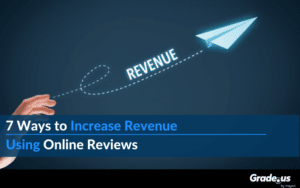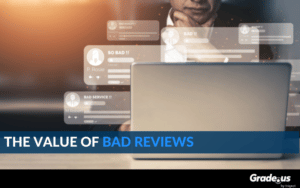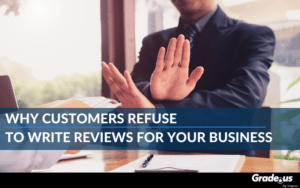The Better Business Bureau (BBB) doesn't really have much in the way of authority. It's not as if they have the power and control to do anything in the way of consequences, right?
So why bother? Do you really need them?
What's so special or significant about the Better Business Bureau that it warrants your time, attention and money? Is there any value to be had by working with the BBB?
Why the Better Business Bureau is an Excellent Review Source
They're trying.
What a lame reason to recommend the BBB. While many consumers believe the BBB is a governing body, the reality is, they're not. Both businesses and customers are free to do as they please.
So, why are they "excellent?"
Compare them to other mainstream providers e.g. Google and Facebook. Imagine that you've received a negative review. What happens next?
Nothing.
If you or another customer comes across a fraudulent review, you can report it. But it's all hit or miss. Maybe these mainstream providers will help you, and maybe you'll get them removed, but probably, you won't.
It all depends.
The gist of things with these providers? They'll get to it when they get to it. As frustrating as this is, it's the reality of the situation. Mainstream providers are inundated with data and requests from billions of users. It's not that they don't care about their individual users, it's simply an overwhelming amount of data.
This is What Makes the BBB Different
They consistently try to facilitate an honest exchange of ideas with customers and businesses. Here, take a look at their customer review verification process.
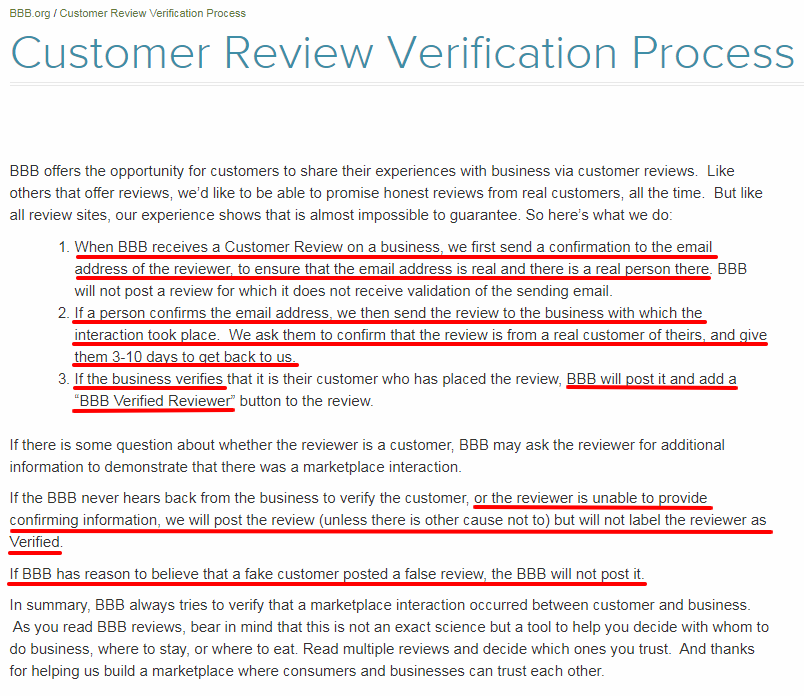
Do mainstream providers (e.g. Google and Facebook) do this?
Not at all.
There's no pre-emptive engagement or interaction with customers. These mainstream providers are simply crowdsourcing review verification.
If you catch it, we'll fix it.
The mentality these mainstream providers have is destructive. If your business is bombarded with fraudulent complaints, fake reviews and toxic feedback you're guilty until proven innocent. You have to fight for the chance to prove your innocence.
Toxic customers do their damage first, you earn the right to share refuting evidence second.
Not so with the BBB, they:
1. Verify each reviewer's email address
2. Once verified, share their review with the offending business
3. The business in question verifies or refutes the claim
4. The review is posted if verified, posted with a note or not posted
Surprising, isn't it?
Business owners are actually given a chance. This isn't the usual process on most review sites. The BBB has an A - F rating system. They also have a review and complaints system.
The A - F system was previously at the center of a significant amount of controversy. In the past, businesses with terrible ratings were often rated at A+.
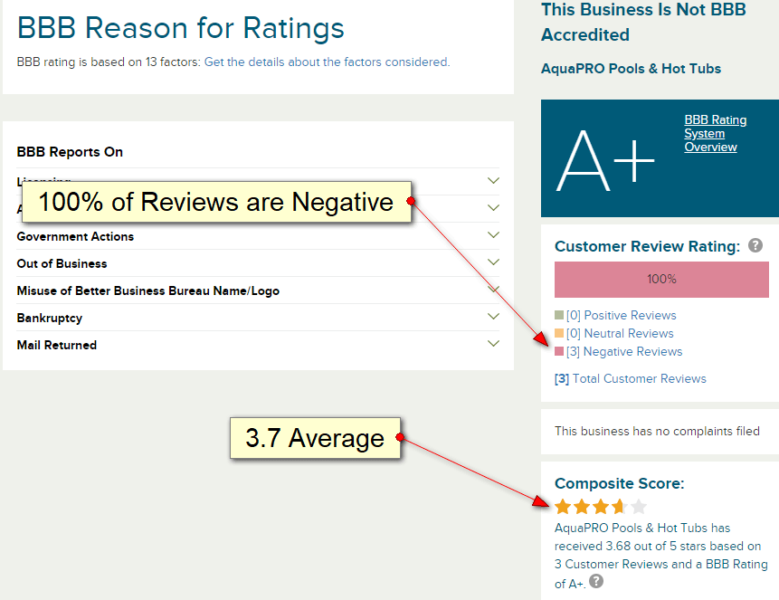
It makes sense then that the BBB decided to overhaul this system.
What did they change? They...
1. Explained that ratings are not a guarantee of reliability or performance.
2. Cautioned consumers to look at business data as a whole.
3. Mentioned that customer reviews aren't used to calculate their letter grade rating.
4. Shared in-depth details explaining how their letter grade is assigned, their 100 point rating scale and more.
5. Changed their rating system so complaints play a (much) more prominent role in establishing ratings.
It was a helpful way to deal with the very real, very legitimate complaints the public had about their service.
What about complaints?
A complaint is essentially a dispute. You provide the BBB with detailed information on your experience with a particular business. They reach out to the business in an attempt to mediate on your behalf. The BBB handles roughly 1 million complaints each year.
Let's take a look at their process for handling customer complaints against a business.
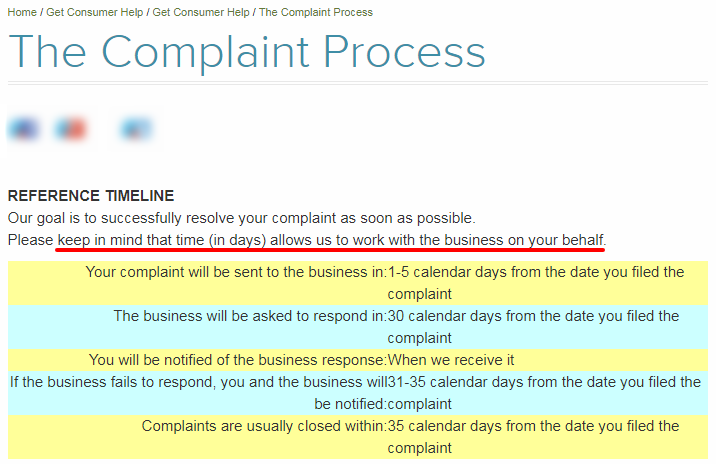
See that there?
They're actively involved in the process. They're attempting to intercede between two disagreeing parties. Can you picture Facebook doing that for your organization?
I can't.
What about reviews?
Reviews, like complaints, are vetted by the BBB. They give businesses a chance to address and verify the details involved with an individual customer's review. They vet customer details and they work to shield businesses from fraudulent or less-than-reputable reviews.
What's the difference?
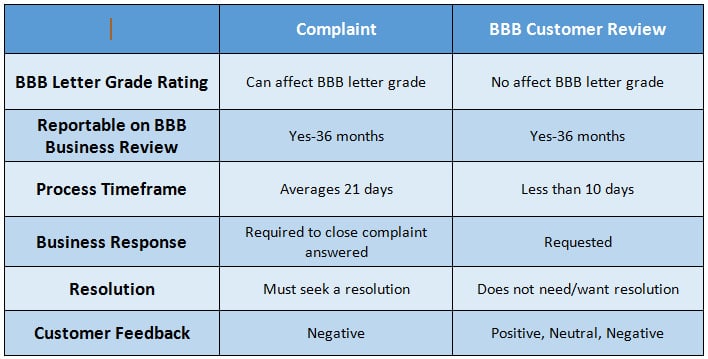
I don't know, maybe this is all a moot point. I mean, come on, are customers really using the BBB in their decision making process?
They are actually.
A Nielsen report gauged the effectiveness of the BBB brand with customers.
- 84% of customers who are familiar with the BBB ratings are more likely to purchase if a business has a high BBB letter grade.
- 83% of customers who are familiar with the BBB are more likely to purchase when a business displays BBB’s accreditation seal.
- Trust compared to other review sites: 81% BBB, 58% Angie’s List and 51% Yelp
Here's some additional details regarding their online activity.
- 1,397,254 online visitors
- 1,654,778 business profiles read
- 390,000+ accredited businesses
- 22,739 accredited business seal clicks
- 407,413 online reviews read
- 2,170 quotes requested
Independent research bears this out.
Customers are still spending a significant amount of time and attention on the BBB. If they're aware of the brand and they understand what it stands for, they're far more likely to rely on it as a trust signal.
This is why they matter.
But, don't take my word for it, search for yourself. Head over to BBB.org and search for businesses in your industry, niche or category. If even a tiny portion of your customer segment uses the BBB, it's still worth your time.
Let's Say Your Customers Rely on the BBB
What do you do?
What does your business need to do to realize the tremendous benefits a positive listing provides?
1. Maintain compliance. The BBB has specific expectations they look for. They don't reward compliance. They penalize businesses for non-compliance.
2. Boost reviews. While this doesn't boost your letter rating, it's still a positive reflection on your business. This improves conversion rates and, depending on your keywords, may appear in search results.
3. Minimize complaints. Complaints have the biggest impact on your letter grade. Minimizing customer complaints by maintaining stringent in-house customer service standards.
4. Respond to reviews/complaints. Responses should be thorough, response times rapid. If you receive a complaint, answer it immediately. Designate a staff member or agency to handle this on your behalf. An A+ rating is impossible with just one unanswered complaint.
5. Monitor your business. The BBB uses a points system for their letter grade. If you'd like an A+ rating you'll need a minimum of 97 points. Monitor your organization's performance closely to meet performance standards.
Build a wonderful business.
It's a simple and straightforward way to generate the kind of results you need from your listing with the BBB.
Why bother?
There are plenty of businesses who joined the BBB, claimed their listing and paid for accreditation. In the end, they stated that it didn't increase the amount of customers they received.
What gives?
Maybe the BBB is worthless after all?
Not at all.
What we're looking at here is an expectations mismatch. These brands initiated a relationship with the BBB hoping for an increase in the amount of new leads and customers they received. While the BBB can attract new customers, they typically don't.
The BBB doesn't help you attract new customers as much as it converts new customers.
It's all about conversion.
If you'd like to maximize the performance of your BBB you use it to convert your customers at key points in the sales process.
- Use it in your remarketing/retargeting campaigns to warm traffic
- Display the BBB logo and your letter grade as a trust seal on your conversion pages (e.g. checkout, confirmation, sign-up, registration, etc.)
- Display it on social media profiles as a helpful aside for new (cold) traffic who aren’t ready to buy
- Display your letter grade in email sales messages
- Use it in your ad copy on platforms like Facebook Ads, Google Ads, LinkedIn Ads, etc.
The effects are cumulative, the results compounding.
Most don't do this.
They sign-up for a membership with their BBB, then they sit back and wait. They wait for the avalanche of leads that never comes.
Own it.
Shoulder the responsibility that comes with greatness. You're running an exceptional business. Bear the responsibility that comes with that. Tell your customers. Share it with prospects. Use it to differentiate your business from competitors.
Don't pass that burden to the BBB.
The rewards that come with positive reviews and ratings are significant - if you do the work.
This is Why the BBB is an Excellent Source
Take the time to cultivate the BBB as a credibility and reputation builder and you'll have the results you need to convert more of the customers you want.
They're working hard for you.
They're working hard for your customers. This is what makes them special and significant. In an era of fake reviews, social justice faux pas, and trolls, the BBB stands out as an ally.
Don't miss the opportunity.
You have the power and control to do anything you'd like with your A+ rating.
Start now.
Work with the BBB to produce the four types of credibility you need to dramatically boost your conversions. If your customers need the BBB, you need the BBB.
Use them to build your reputation.
With consistent effort, you'll achieve the outstanding results your business needs to grow rapidly.
About the Author
Andrew McDermott
Andrew McDermott is the co-founder of HooktoWin. He shows entrepreneurs how to attract and win new customers.




